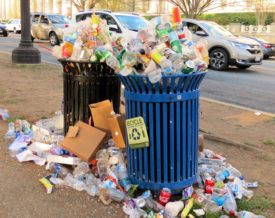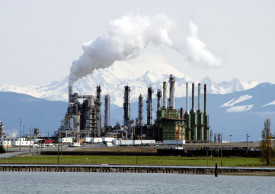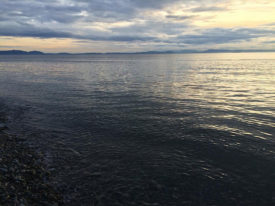Climate change is a universal menace, threatening hardships for everyone. But it’s not an egalitarian menace: everyone will not suffer equally. Perversely, those people and nations least to blame for causing it are most vulnerable to its impacts.
Climate disruption heaps misfortune on the less fortunate, whether in low-lying Bangladesh, the Ninth Ward of New Orleans, or the flood plains around Chehalis, Washington. In climate change, the less you have, the more you’re likely to lose.
“The division of labor among nations,” wrote historian Eduardo Galeano, “is that some specialize in winning and others in losing.” Those left behind in the global economic race will suffer the most from climate change too. Poor nations with tiny carbon footprints are those most threatened. Hundreds of millions of people in low-lying Bangladesh, island nations such as the Philippines and Indonesia, and drought-prone Africa will bear the brunt. Their homelands will become uninhabitable; unlike better-off people, they lack the wealth to move or adapt.
In Cascadia, too, climate change promises to widen the gap between economic winners and everyone else. Here, it’s working families, particularly in rural areas, who face the worst climate insecurity. Low-income families are most likely to live in flood plains or fire-prone forests. (Or, I should say, if they have a home in the woods, it’s their only home, not a second home). Like Bangladeshi peasants, they’re unlikely to have the means to move to safer ground. What’s more, they are least likely to have health insurance to protect themselves from diseases spreading from the tropics.
Woods workers in British Columbia are already losing jobs from the climate-induced plague of pine beetles laying waste to the forests. Reservation-dwelling Native Americans and First Nations are vulnerable because of their dependence on fisheries, forestry, and agriculture. Immigrant farm laborers—among the poorest workers in Cascadia—also face disproportionate hardship. Dwindling supplies of irrigation water will squeeze harvest jobs, and crop failures from more-variable weather will post “not hiring” signs across farm counties.
This epic injustice gives the lie to the argument that stopping climate change is “just” an environmental issue. Indeed, it makes arresting climate change as much a social priority as an environmental one.
And it argues for climate solutions that are not only efficient and effective but also fair. A certain amount of climate change is already unavoidable. Inevitably, it will punish the blameless. Because climate change takes disproportionately from the poor, we should design our climate solutions to help the poor disproportionately. In other words, climate solutions should make working families and poor nations economically whole.
How to do this? Next time…








MichelleV.P.
I whole-heartedly agree with you that “arresting climate change [is] as much a social priority as an environmental one.” And I look forward to reading your next post about how to intelligently address this.In the meantime, here are some links from a recent article in Fast Company about an issue that I’ve been grappling with for some time: How to make smart investment decisions without harming either the environment or other people. The article’s (long) title and sub-title pose this poignant question:”Oil: It’s a dilemma for investors who want hefty returns and a clean green conscience. Can you own Big Oil and still feel good in the morning?”I’m no Bill Gates, but it seems to me that sensible investment decisions that encourage clean green business would make environmental and social winners of every economic spectrum.The article measures the environmental and social impacts of these 10 major oil companies. For more explanation about how these individual companies fared in their ratings, see the links on this page.Good provocative reading!
Benje Evans
I find it amusing that supposedly educated people will gleefully call for the demise of their own society and way of life. There are not enough power plants in all the land to power the electric cars that you want – yet you will not allow more plants to be built.R, manufacturing and disposal of the batteries in the cars that we can’t charge are far worse for the environment as a whole that gasoline automobiles.You clamor for environmental responsibility while completely ignoring the facts that lead everyone else to realize the pace you want cannot be kept.What little industry we have will leave the US. ~ LESS jobsTransportation will become too expensive for citizens. ~ larger cities, denser population centers, more crime, more diseaseFar greater costs to produce and transport food ~ higher pricesI hope carbon credits are tasty and nutritious!What you seek is a 40 year solution to a 200 year problem. In the process you will turn a once vibrant country into a 3rd workd dump and thereby remove the progress and innovation that we could offer from the rest of the world. What next? Store your trash under your bed to keep it out of the landfills?